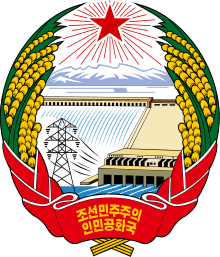Israel–North Korea relations
 | |
Israel |
North Korea |
|---|---|
Israeli-North Korean relations (Korean: 이스라엘-조선민주주의인민공화국 관계) are very hostile,[1] and North Korea has never recognized the state of Israel, denouncing it as an "imperialist satellite".[2] Since 1988 it recognises the sovereignty of the State of Palestine over all of Israel, except for the Golan Heights, which it recognises as part of Syria.
History
North Korea sent 20 pilots and 19 non-combat personnel to Egypt during Yom Kippur War. The unit had four to six encounters with the Israelis from August through the end of the war. According to Shlomo Aloni, the last aerial engagement on the Egyptian front, which took place on 6 December, saw Israeli F-4s engage North Korean-piloted MiG-21s. The Israelis shot down one MiG, and another was shot down by friendly fire from Egyptian air defenses.[3]
Over the years, North Korea has supplied missile technology to Israel's neighbours, including Iran, Syria, Libya, and Egypt.[4][5][6] Syria, which has a history of confrontations with Israel, has long maintained a relationship with North Korea based on the cooperation between their respective nuclear programs. On 6 September 2007, the Israeli Air Force conducted airstrike "Operation Orchard" on a target in the Deir ez-Zor region of Syria. According to media reports, 10 North Koreans who "had been helping with the construction of a nuclear reactor in Syria" were killed during the airstrike.[7]
When North Korea opened up to foreign tourists in 1986 it excluded citizens of Israel along with those of the United States, Japan, Taiwan, and South Africa.[8] Jewish people from other countries have experienced problems entering North Korea. Israel has called for world action against North Korea's nuclear weapons programme.[9] It has been suggested that North Korea has sought to model its nuclear weapons programme on Israel's, as "a small-state deterrent for a country surrounded by powerful enemies; to display enough activity to make possession of a nuclear device plausible to the outside world, but with no announcement of possession: in short, to appear to arm itself with an ultimate trump card and keep everyone guessing whether and when the weapons might become available."[10]
Following the fall of the Soviet Union, Israel sent a diplomatic delegation to North Korea, but the efforts were stopped by then-Israeli Prime Minister Yitzhak Rabin, possibly due to United States and Mossad pressure.[11]
In May 2010 the Israeli foreign minister, Avigdor Lieberman, labeled North Korea as part of an "axis of evil"; he stated:
"This axis of evil that includes North Korea, Syria and Iran, it's the biggest threat to the entire world".[12]
In 2014 as the Israel–Gaza conflict escalated, North Korea allegedly negotiated arms deals with Hamas.[13] This was however denied by the KCNA a few days later.[14]
See also
- Foreign relations of Israel
- Foreign relations of North Korea
- North Korea–Palestine relations
- North Korea–South Korea relations
- Iran-North Korea relations
- Iran-Israel relations
References
- ↑ Benjamin R. Young, How North Korea has been arming Palestinian militants for decades, NK News, 25 June 2014
- ↑ Haggard, M (1965). "North Korea's International Position". Asian Survey. California, United States: University of California Press. 5 (8): 375–388. ISSN 0004-4687. OCLC 48536955. doi:10.2307/2642410.
- ↑ "Israeli F-4s Actually Fought North Korean MiGs During the Yom Kippur War".
- ↑ "North Korea Military Threat to Israel - Jewish Virtual Library".
- ↑ Reuters (4 October 2016). "Israel: North Korea Supplying Weapons to Six Mideast States" – via Haaretz.
- ↑ "Israel: North Korea shipping WMDs to Syria". 12 May 2010.
- ↑ Tak Kumakura (28 April 2008). "North Koreans May Have Died in Israel Attack on Syria, NHK Says". Bloomberg. Archived from the original on 3 November 2012. Retrieved 28 April 2008.
- ↑ Koh, B (1988). "North Korea in 1987: Launching a New Seven-Year Plan". Asian Survey. California, United States: University of California Press. 28 (1): 62–70. ISSN 0004-4687. OCLC 48536955. doi:10.1525/as.1988.28.1.01p0121e.
- ↑ Ravid, Barak; Press, The Associated (25 May 2017). "Israel Demands World 'Respond Decisively' to North Korea Nuclear Test" – via Haaretz.
- ↑ Cha, Victor (2002). "North Korea's Weapons of Mass Destruction: Badges, Shields, or Swords?". Political Science Quarterly. New York, United States: The Academy of Political Science. 117 (2): 209–230. ISSN 0032-3195. OCLC 39064101. doi:10.2307/798181.
- ↑ Ahren, Raphael (August 10, 2017). "The curious tale of Israel’s short-lived courtship of North Korea". The Times of Israel. Retrieved August 10, 2017.
- ↑ Israel Minister: Iran, Syria, And North Korea Are New 'Axis Of Evil'
- ↑ "Hamas and North Korea in secret arms deal". Daily Telegraph. 26 July 2014. Retrieved 15 August 2014.
- ↑ "North Korea denies reports of missile deal with Hamas". Daily Telegraph. 26 July 2014. Retrieved 31 May 2015.

